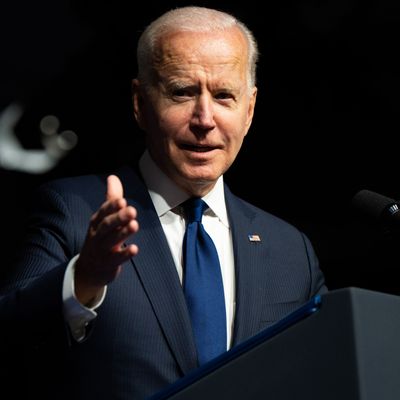
On Tuesday, President Joe Biden traveled to Oklahoma to commemorate the 100th anniversary of the Tulsa massacre of 1921, where a white mob attacked African-American residents and firebombed the Black-owned Greenwood District, resulting in as many as 300 deaths and 35 blocks destroyed.
“For much too long, the history of what took place here was told in silence, cloaked in darkness,” Biden said, becoming the first president to travel to Tulsa to observe the anniversary. “But just because history is silent, it doesn’t mean that it did not take place.”
While the president toured the Greenwood Cultural Center and met with survivors of the massacre — including the 106-year-old Lessie Benningfield Randle — Biden also looked forward on Tuesday, vowing to pursue several initiatives to cut the racial wealth gap and ensure voting rights for all Americans. It did not go perfectly for the gaffe-prone president:
Putting aside the latest trends in the marketing of cleaning products, Biden announced a federal initiative to boost the percentage of federal contracts going to small, minority- and women-owned businesses by 50 percent by 2026; the administration has estimated that such an increase would provide $100 billion in contracts to qualifying firms. Biden also reiterated his pledge to use $10 billion in infrastructure funds to rebuild underserved communities throughout the U.S., and promised to enhance the Fair Housing Act so that the federal government can “more vigorously enforce” the law first passed in 1968.
With the effort to secure voting rights stalled out on Capitol Hill, Biden also announced a renewed legislative push to enfranchise Americans — just as Republican state lawmakers chip away at ballot access throughout the country. After identifying state laws passed in the wake of Trump’s loss an “unprecedented assault on our democracy,” he said that Vice-President Kamala Harris will lead the movement to secure votes to pass the John Lewis Voting Rights Advancement Act. “With her leadership and your support, we’re going to overcome again,” Biden said. “I promise you. It’s going to take a hell of a lot of work.”
Notably, the president also called out members of the Democratic Senate caucus who have been reluctant to do that work. “I hear all of the folks on TV saying why doesn’t Biden get this done?” Biden said. “Well, because Biden only has the majority of effectively four votes in the House and a tie in the Senate — with two members of the Senate who vote more with my Republican friends.” For Harris to whip up the support to pass a new Voting Rights Act, she’ll need more than just the support of Kyrsten Sinema and Joe Manchin, the Arizona and West Virginia Democrats who were referenced by Biden and have been reluctant to sign on to different aspects of his agenda.
Unlike the American Recovery Act passed by reconciliation, a voting rights agenda would need the support of 10 senators from the party actively trying to erode voting rights in the United States. Despite this challenge — and the stalled talks on an infrastructure bill — Biden anticipated that June will be a “month of action.”






























